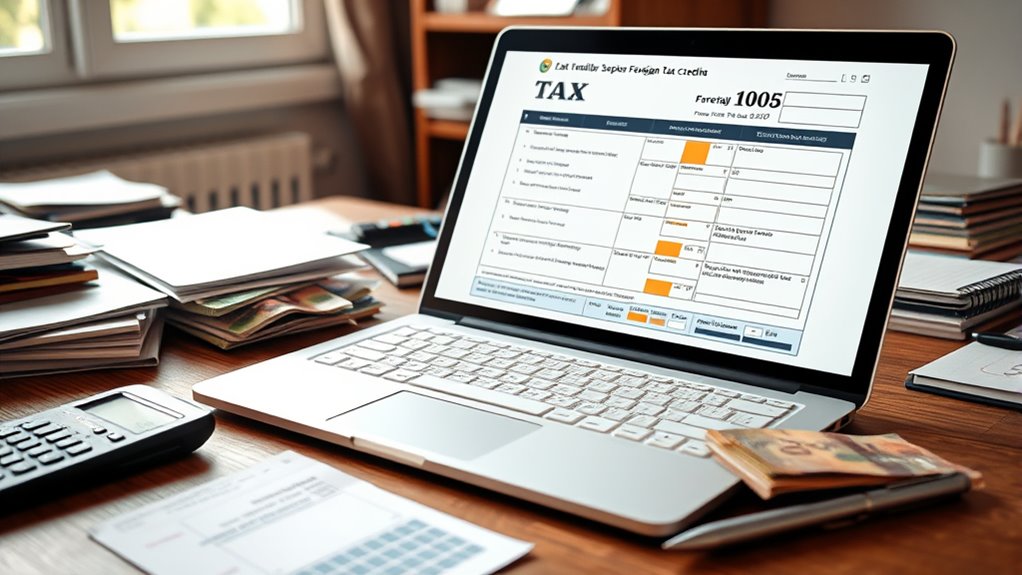To claim foreign tax credits on your 2025 return, you’ll need to understand the new IRS rules and how international tax treaties influence your qualification and credit calculation. Make certain you gather proper documentation, like withholding statements and treaty provisions, and stay updated on recent guideline changes. Properly applying these updates can maximize your credits and ensure compliance. If you’re keen to navigate these complexities accurately, you’ll find valuable insights ahead.
Key Takeaways
- Understand new IRS rules for foreign tax credits to ensure proper claim procedures on your 2025 return.
- Review relevant tax treaties that may affect credit eligibility and calculation.
- Gather detailed documentation, including withholding statements and treaty correspondence, for accurate reporting.
- Be aware of updated reporting forms and requirements introduced in the 2025 tax changes.
- Follow best practices by staying informed on IRS guidelines and maintaining thorough records to maximize credits.

Are you prepared for the changes to foreign tax credits in 2025? The upcoming updates will impact how you claim credits on your tax return, making it essential to understand the new rules. One of the most significant factors influencing your foreign tax credit is the role of tax treaties. These treaties are agreements between the United States and other countries designed to prevent double taxation and promote fair taxation practices. When claiming your credits, you’ll need to consider the specific provisions outlined in these treaties, as they can alter how much credit you’re eligible for or whether certain income qualifies. The IRS provides guidance on how to interpret these treaties, and it’s crucial to stay current with their guidelines to guarantee you’re claiming your credits correctly.
The IRS guidelines serve as the foundation for understanding the complexities of foreign tax credits. They detail what qualifies as a foreign tax, how to calculate the credit, and the documentation you’ll need to substantiate your claim. With the 2025 changes, the IRS is expected to refine some of these rules, especially around how income from different sources is treated and how to handle situations involving multiple countries. For example, if you earn income in a country with which the U.S. has a tax treaty, the IRS guidelines will specify how to apply treaty benefits to reduce your tax liability. It’s important to review these guidelines carefully to avoid errors that could lead to delays or audits.
Additionally, the updated rules will likely impact how you report foreign taxes paid. You may need to file additional forms or provide more detailed documentation to support your claim. The IRS has been emphasizing transparency and accuracy, especially in cross-border tax situations. Make sure you keep thorough records of all foreign taxes paid, including withholding statements and any correspondence related to tax treaties. These records will be essential if the IRS questions your claim or if you need to adjust your credits later. Being aware of common pitfalls can help you avoid mistakes that could jeopardize your claim.
As you prepare your 2025 return, familiarize yourself with the latest IRS guidelines and how they interact with tax treaties. This proactive approach will help you maximize your foreign tax credits while remaining compliant with the law. Remember, the rules are evolving, and staying informed will guarantee you don’t miss out on credits you’re entitled to or inadvertently claim an ineligible amount. By understanding the interplay between tax treaties and IRS guidelines, you can confidently navigate the process and optimize your tax situation for the coming year.
Frequently Asked Questions
Can I Claim Foreign Tax Credits for Income Earned Before 2025?
Yes, you can claim foreign tax credits for income earned before 2025, including historical tax credits related to pre-2025 income. When you file your 2025 return, you’ll need to report any foreign taxes paid on income from previous years. Make sure to keep detailed records of these taxes and income to accurately claim the credits and avoid issues with the IRS.
How Do I Avoid Double Claiming Foreign Tax Credits?
To avoid double claiming foreign tax credits, you should keep detailed records of the taxes paid abroad and make certain you don’t claim the same credits twice, which is a common tax credit myth. Use proper foreign tax planning strategies, such as filing IRS Form 1116, to accurately report your foreign taxes. This helps you maximize your credits while complying with tax laws and prevents accidental double benefits.
Are There Limits on the Amount of Foreign Tax Credits I Can Claim?
You can’t claim unlimited foreign tax credits; there’s a huge cap called the foreign tax cap that limits how much you can claim. Tax credit limits are set to prevent you from double-dipping, so if your foreign taxes exceed this limit, you won’t get a credit for the extra. Always track your foreign taxes carefully to guarantee you don’t overshoot the foreign tax cap and lose potential credits.
What Documentation Is Required to Substantiate Foreign Taxes Paid?
You need to keep detailed documentation of your foreign taxes paid, such as foreign tax withholding statements, tax payment receipts, or official tax authority documents. The substantiation process requires these records to verify the amount of foreign taxes you claim as a credit. Make certain your documentation clearly shows the payer, amount, date, and type of tax paid, so you can confidently substantiate your claim if questioned by the IRS.
How Do Foreign Tax Credits Affect My State Tax Return?
You might worry foreign tax credits complicate your state return, but they generally reduce your state taxes as well. Some states accept federal credits directly, while others have different rules. Keep in mind, if your foreign credits exceed your state tax liability, a credit carryover might apply. To maximize benefits and avoid errors, check your state’s specific rules on foreign tax credits and consult a tax professional if needed.
Conclusion
Steering foreign tax credits in 2025 is like planting seeds in fertile ground—you’ll reap the benefits when you carefully follow the rules. Remember, the IRS is your gardener, tending to the details so your tax garden flourishes. With a little attention and some savvy planning, you’ll turn what seems like a tangled jungle into a lush landscape of savings. Stay vigilant, and watch your efforts bloom into a rewarding harvest on your tax return.









